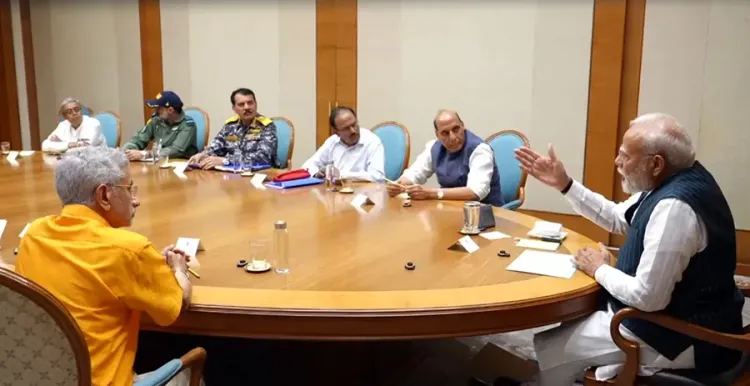Is India Ready to Confront Pakistan's Duplicity?

Synopsis
Key Takeaways
- India is adopting a more assertive diplomatic stance.
- Operation Sindoor signifies a shift in policy.
- International platforms must be leveraged for advocacy.
- Pakistan's duplicity is being called out globally.
- Zero tolerance for terrorism is the new doctrine.
New Delhi, June 29 (NationPress) It is crucial for India to adopt a more aggressive stance on all matters related to Pakistan on the global stage. Operation Sindoor has exposed the realities of international diplomacy and highlighted that the struggle must be faced head-on. The resolution to this issue cannot come from outside; it requires a firm stand and direct confrontation.
India has taken the lead, demonstrating confidence and a readiness to confront those who threaten its progress and right to assert itself, but there is still much to accomplish.
In an international landscape where diplomacy often leads to procrastination and where terrorism finds refuge behind sovereign borders, India has wisely opted for a more assertive doctrine. Operation Sindoor is more than just a military action; it is a clear statement that New Delhi will no longer settle for merely managing the consequences of terrorism but is determined to eradicate its roots.
The terror attack on April 22 in Pahalgam, which claimed 26 lives, stands as one of the most devastating incidents in recent times. India's reaction, Operation Sindoor, was prompt, strategic, and unapologetic. It not only targeted the attackers but also marked the beginning of a significant policy shift: India will no longer tolerate cross-border terrorism, nor will it permit Pakistan to use diplomacy as a shield.
However, the global reaction to this justified act of self-defense revealed some uncomfortable realities. The very nations that condemned the Pahalgam attack, many of which claim to oppose terrorism, were surprisingly silent regarding Operation Sindoor. The United States, which had expressed support for dealing with the attackers, did not hold Pakistan accountable. This abrupt change in stance regarding Pakistan has disappointed New Delhi.
This situation underscores a critical truth: in a tumultuous global order, India must fight its own battles -- and achieve victory independently. India is now taking the diplomatic struggle worldwide, exposing Pakistan's duplicity at every opportunity.
Defence Minister Rajnath Singh's decision not to endorse the joint statement during the Shanghai Cooperation Organisation (SCO) meeting was a significant moment. His resolute stance and direct references to cross-border terrorism conveyed a powerful message -- not just to Islamabad but also to Beijing, which continues to protect Pakistan in international arenas.
This was more than mere optics. India's position at the SCO effectively disrupted the China-Pakistan narrative. While China aligned itself with its 'iron brother', India asserted that the group must take a strong stand against terrorism.
India's approach since Operation Sindoor showcases a rare clarity and consistency. For the first time in years, India is actively countering -- legally, diplomatically, and economically -- Pakistan's global narratives and attempts to internationalize issues.
Consider the Indus Waters Treaty (IWT). In response to the Pahalgam attack, India put the treaty on hold, citing the futility of maintaining goodwill with a nation that continually sponsors terror. When Pakistan approached the so-called Court of Arbitration in The Hague to challenge India regarding the treaty, India was unequivocal. It labeled the arbitration process as "illegally constituted" and the panel as lacking authority under the IWT. More importantly, it referred to Pakistan's actions as a "charade" and a diversion from its accountability as a global terrorism hub.
India's emerging stance is straightforward yet impactful: Pakistan cannot seek global sympathy while fostering terrorism on its territory. It cannot be regarded as a responsible country while it continues to destabilize an entire region.
Nevertheless, while India has begun to voice its concerns more forcefully, there is still much work to be done. For far too long, New Delhi has depended on diplomacy infused with restraint. This must now transform into diplomacy grounded in evidence, exposure, and escalation.
Every international platform -- whether it is the United Nations, G20, SCO, or BRICS -- must be utilized to highlight Pakistan's perilous double-dealing.
Moreover, it is not merely about delivering speeches. India must spearhead a coalition of like-minded nations that have suffered from state-sponsored terrorism to ensure that terrorism is a core issue in global policy discussions, rather than a peripheral topic raised only in the wake of an attack.
Operation Sindoor has established the groundwork for a new India -- one that retaliates when provoked and exposes duplicity when encountered.
However, this initiative must not be an isolated incident. It should evolve into a doctrine of zero tolerance, where no Pakistani involvement -- direct or indirect -- goes unanswered, and where every attempt by Pakistan to engage, accuse, or mislead is met with factual rebuttal and decisive action.
(Deepika Bhan can be contacted at deepika.b@ians.in)





